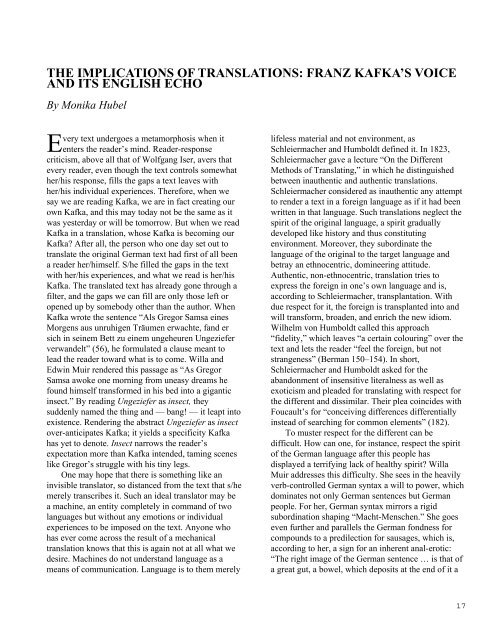their - The University of Texas at Dallas
their - The University of Texas at Dallas
their - The University of Texas at Dallas
You also want an ePaper? Increase the reach of your titles
YUMPU automatically turns print PDFs into web optimized ePapers that Google loves.
THE IMPLICATIONS OF TRANSLATIONS: FRANZ KAFKA’S VOICE<br />
AND ITS ENGLISH ECHO<br />
By Monika Hubel<br />
E<br />
very text undergoes a metamorphosis when it<br />
enters the reader’s mind. Reader-response<br />
criticism, above all th<strong>at</strong> <strong>of</strong> Wolfgang Iser, avers th<strong>at</strong><br />
every reader, even though the text controls somewh<strong>at</strong><br />
her/his response, fills the gaps a text leaves with<br />
her/his individual experiences. <strong>The</strong>refore, when we<br />
say we are reading Kafka, we are in fact cre<strong>at</strong>ing our<br />
own Kafka, and this may today not be the same as it<br />
was yesterday or will be tomorrow. But when we read<br />
Kafka in a transl<strong>at</strong>ion, whose Kafka is becoming our<br />
Kafka After all, the person who one day set out to<br />
transl<strong>at</strong>e the original German text had first <strong>of</strong> all been<br />
a reader her/himself. S/he filled the gaps in the text<br />
with her/his experiences, and wh<strong>at</strong> we read is her/his<br />
Kafka. <strong>The</strong> transl<strong>at</strong>ed text has already gone through a<br />
filter, and the gaps we can fill are only those left or<br />
opened up by somebody other than the author. When<br />
Kafka wrote the sentence “Als Gregor Samsa eines<br />
Morgens aus unruhigen Träumen erwachte, fand er<br />
sich in seinem Bett zu einem ungeheuren Ungeziefer<br />
verwandelt” (56), he formul<strong>at</strong>ed a clause meant to<br />
lead the reader toward wh<strong>at</strong> is to come. Willa and<br />
Edwin Muir rendered this passage as “As Gregor<br />
Samsa awoke one morning from uneasy dreams he<br />
found himself transformed in his bed into a gigantic<br />
insect.” By reading Ungeziefer as insect, they<br />
suddenly named the thing and — bang! — it leapt into<br />
existence. Rendering the abstract Ungeziefer as insect<br />
over-anticip<strong>at</strong>es Kafka; it yields a specificity Kafka<br />
has yet to denote. Insect narrows the reader’s<br />
expect<strong>at</strong>ion more than Kafka intended, taming scenes<br />
like Gregor’s struggle with his tiny legs.<br />
One may hope th<strong>at</strong> there is something like an<br />
invisible transl<strong>at</strong>or, so distanced from the text th<strong>at</strong> s/he<br />
merely transcribes it. Such an ideal transl<strong>at</strong>or may be<br />
a machine, an entity completely in command <strong>of</strong> two<br />
languages but without any emotions or individual<br />
experiences to be imposed on the text. Anyone who<br />
has ever come across the result <strong>of</strong> a mechanical<br />
transl<strong>at</strong>ion knows th<strong>at</strong> this is again not <strong>at</strong> all wh<strong>at</strong> we<br />
desire. Machines do not understand language as a<br />
means <strong>of</strong> communic<strong>at</strong>ion. Language is to them merely<br />
lifeless m<strong>at</strong>erial and not environment, as<br />
Schleiermacher and Humboldt defined it. In 1823,<br />
Schleiermacher gave a lecture “On the Different<br />
Methods <strong>of</strong> Transl<strong>at</strong>ing,” in which he distinguished<br />
between inauthentic and authentic transl<strong>at</strong>ions.<br />
Schleiermacher considered as inauthentic any <strong>at</strong>tempt<br />
to render a text in a foreign language as if it had been<br />
written in th<strong>at</strong> language. Such transl<strong>at</strong>ions neglect the<br />
spirit <strong>of</strong> the original language, a spirit gradually<br />
developed like history and thus constituting<br />
environment. Moreover, they subordin<strong>at</strong>e the<br />
language <strong>of</strong> the original to the target language and<br />
betray an ethnocentric, domineering <strong>at</strong>titude.<br />
Authentic, non-ethnocentric, transl<strong>at</strong>ion tries to<br />
express the foreign in one’s own language and is,<br />
according to Schleiermacher, transplant<strong>at</strong>ion. With<br />
due respect for it, the foreign is transplanted into and<br />
will transform, broaden, and enrich the new idiom.<br />
Wilhelm von Humboldt called this approach<br />
“fidelity,” which leaves “a certain colouring” over the<br />
text and lets the reader “feel the foreign, but not<br />
strangeness” (Berman 150–154). In short,<br />
Schleiermacher and Humboldt asked for the<br />
abandonment <strong>of</strong> insensitive literalness as well as<br />
exoticism and pleaded for transl<strong>at</strong>ing with respect for<br />
the different and dissimilar. <strong>The</strong>ir plea coincides with<br />
Foucault’s for “conceiving differences differentially<br />
instead <strong>of</strong> searching for common elements” (182).<br />
To muster respect for the different can be<br />
difficult. How can one, for instance, respect the spirit<br />
<strong>of</strong> the German language after this people has<br />
displayed a terrifying lack <strong>of</strong> healthy spirit Willa<br />
Muir addresses this difficulty. She sees in the heavily<br />
verb-controlled German syntax a will to power, which<br />
domin<strong>at</strong>es not only German sentences but German<br />
people. For her, German syntax mirrors a rigid<br />
subordin<strong>at</strong>ion shaping “Macht-Menschen.” She goes<br />
even further and parallels the German fondness for<br />
compounds to a predilection for sausages, which is,<br />
according to her, a sign for an inherent anal-erotic:<br />
“<strong>The</strong> right image <strong>of</strong> the German sentence … is th<strong>at</strong> <strong>of</strong><br />
a gre<strong>at</strong> gut, a bowel, which deposits <strong>at</strong> the end <strong>of</strong> it a<br />
17

















